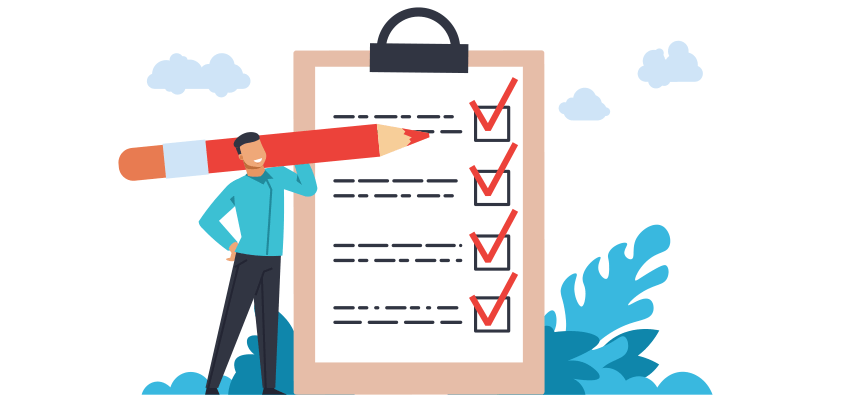
Click the button to start reading
The Ultimate Guide to Hiring a Freelancer
Now that it’s clear that freelancing is here to stay, it’s time for companies to start adapting. If you’re looking to hire talented freelancers, but you’re not sure where to start, we’ve got you covered.
This guide will teach you everything you need to know about hiring a freelancer.

Freelancing defined
A freelancer is a professional who offers their services to businesses or individuals temporarily. They are usually self-employed and work independently.
The benefits of hiring quality freelancers:
There are many benefits of working with the best freelancers. Here are some key advantages:
- You can get started quickly: When you hire a freelancer, you don’t have to go through the hassle of onboarding or training someone new because they already have the skills and experience you need.
- You can hire them for as long or short as you need: With freelancers, you’re not locked into a long-term contract. If you only need someone for a short-term project, you can hire them just for that. You are not obligated to turn them into a full-time employee.
- You can treat them as independent contractors for technical skills: This can be a cost-effective way to get access to the technical skills you need without having to hire a full-time employee.
- They can be a valuable addition to your team: the right freelancer can bring a new perspective and skill set to your team.
- You can work with them remotely: With advances in technology, it’s now easier than ever to work with someone remotely.
- You can scale up or down as needed: If you need to increase or decrease the amount of work you’re doing, freelancers can be a flexible option.
- They can help with overflow work: When your team is overwhelmed with work, freelancers can help by taking on some of the workloads.
- The hiring process is usually quicker: When you’re hiring a freelancer, the process is usually quicker than finding and onboarding a new full-time employee.
- You’re not responsible for their benefits: If you hire freelancers, you don’t have to worry about providing them with health insurance or other benefits.
- You can try before you buy: Hiring freelancers is a great way to test out someone’s skills before you make a long-term commitment.
As you can see, there are a lot of compelling reasons to work with a freelancer. Just be careful to tailor your recruiting around your specific needs.

What to Consider When Hiring a Freelancer?
Once you’ve decided to use freelancers, it’s critical to know how to do so correctly. Here are a few things you need to take into account.
First, you need to consider the scope of the project. What exactly do you need done? Make sure you’re clear about the deliverables, deadlines, and budget before you start looking for a freelancer.
You also need to think about the skills you need. What kind of skills does the freelancer need to have to complete the project? You should also take into account the cultural fit. Are you looking for someone who is a good fit for your company culture?
Finally, you need to consider the price. How much are you willing to pay for the project?
Where to look for freelance talent?
After you’ve decided what you’re looking for in a freelancer, it’s time to start looking for talent. Here are a few places to look:
- Freelance job boards: When you’re looking for a freelancer, the best place to start is by looking on freelance job boards. Several different job boards cater specifically to freelancers, such as UpWork, Freelancer, and Fiverr.
- Social media: Social media is a great place to find freelancers. Start by searching for relevant hashtags, such as #freelancewriter or #graphicdesigner. You can also post about your project on social media and see if any freelancers reach out to you. There are also communities like Reddit, where you can find freelancers.
- Niche websites: If you’re looking for more specific skills, you can also look on niche websites. For example, if you need a logo designed, you can go to 99designs. If you need someone to write code, you can go to Toptal.
- Offline resources: There are also several offline resources you can use, such as job fairs, meetups, and co-working spaces. You could start by asking people in your network if they know anyone who could do the job.

How to Post a Job for Freelancers
After you’ve considered what you need and where you can find talent, it’s time to write a job listing. This can be a tricky task, as you need to make sure you’re clear about the scope of the project, the skills you’re looking for, and the price you’re willing to pay.
If you’re not sure how to write a job listing, don’t worry – we’ve got you covered. Here’s a step-by-step guide on how to write a job listing that will attract the best talent:
1. Start with a direct headline
The headline is the first thing freelancers will see, so you need to make sure it’s attention-grabbing. A good headline should be clear and concise, and it should give an overview of the project.
A great template for this would be: “Looking for a _____ to do _____ for _____.” For example: “Looking for a copywriter to write blog posts for a tech company.” Direct and clarity are key here. You want to make sure the freelancer knows exactly what they’re getting into before they even apply.
It could be a nightmare if you have to explain the project in more detail after you’ve already hired someone, so make sure you’re as clear as possible from the beginning.
2. Give a fairly detailed overview of the project
The next thing you need to do is give an overview of the project. This is where you’ll need to be clear about the job. Make sure you’re as specific as possible to avoid any misunderstandings later on. If you’re not sure about something, it’s better to be too specific than too vague.
In the description, you should include all the details about the project. This includes :
- what the project is
- the deadline
- an overview of the deliverables
So for example you could write something like:
“We’re looking for a seasoned freelance writer to write 10 blog posts for our website. The ideal candidate will have experience writing about the tech industry, and they should be able to write engaging and informative content.
The deliverables for this project will be 10 well-written blog posts, with a word count of at least 800 words each. We will provide you with a list of topics to write about, but we’re also open to hearing your ideas.
We’re looking for someone who can start working on this immediately and who can complete the project within 2 weeks.”
By including all the relevant details, you’ll save yourself a lot of hassle later on.

3. List the required skills
In this section, you should list all the skills you’re looking for in a freelancer. This could be anything from specific software skills to industry experience. If you’re not sure about what you need, take a look at similar projects and see what kind of skills they require.
To use our example above, some skills a freelance writer might need would be:
- Excellent writing skills
- Self Editing
- SEO Writing
- Research Skills
- The ability to meet deadlines
The more skills you list, the more likely you are to find a freelancer who’s a perfect match for your project. However, don’t list too many skills as this could discourage potential candidates.
4. Indicate the price
Depending on your scenario, you may want to list the price in the job listing or you may want to negotiate it with the freelancer after they’ve been hired. The truth is, when it comes to pay, you have options. You can either offer a lump sum for the entire project or you can pay by the hour.
If you’re not sure about what to pay, there are a few ways to think about it. You can either research what others are paying for similar projects, or you can figure out how much you’re willing to spend on the project.
Just be sure to indicate the price to the degree of specificity that you’re comfortable with. If you’re not sure about the price, it’s better to be vague. Something you could say is, “pay is open for negotiation based on skills and experience.”
5. Give a deadline for receiving proposals
In this section, you should give a deadline for when you want to receive proposals from freelancers. This will help you keep track of the applications and it will also let the freelancers know how much time they have to apply.
You should pay attention to the prompt applicants and the late ones. This could be an indication of how they’ll handle deadlines in the future. Another thing to note is the people that need a lot of help before they can submit a proposal. These are the people that you may want to avoid, as they might need too much hand-holding for the project.
6. Indicate how you will be assessing proposals
After you’ve received proposals from freelancers, you’ll need to assess them and decide who to hire. There are a few things you should keep in mind when you’re doing this.
First, you should assess whether or not the freelancer has the required skills. This is something you should have listed in the job posting, so it should be easy to check off. Next, you’ll want to take a look at their portfolio. This is a great way to get an idea of their work and see if they’re a good fit for the project.
Finally, you should assess their proposal itself. This is where you’ll be able to see how well they understand the project and if they’re capable of doing the work.
7. Choose the freelancer
After you’ve assessed all the proposals, it’s time to choose the freelancer you want to hire. This is usually a combination of all the factors we’ve discussed so far. The freelancer should have the required skills, a good portfolio, and a strong proposal.
Once you’ve chosen the freelancer, you can reach out to them and start working on the project.
Hiring a freelancer doesn’t have to be complicated. If you take the time to write a good job posting and assess the proposals carefully, you’ll be able to find the right freelancer for the job. Just remember to communicate clearly, set expectations, and establish trust with your freelancer. If you do this, you’ll be able to have a successful working relationship.
Note: If you’re not sure who to hire, you can always ask for more information from freelancers. This could be anything from a clarification on their proposal to a sample of their work.

Assessing Freelance Proposals
Okay so now you have the posting up and you’re starting to receive proposals in your inbox. How do you sift through them and decide who to work with? Here are some key factors:
1. Are they available when you need them?
This is important because you don’t want to be waiting around for a freelancer that isn’t available when you need them. Check their availability before you move forward with anyone.
2. Do they have the required skills?
You should have listed the required skills in the job posting, so now it’s time to check and see if the freelancer has them. If they don’t, then you can move on to the next freelancer.
3. Take a look at their portfolio.
A great way to get an idea of someone’s work is to take a look at their portfolio. This will give you a better understanding of their style and skills.
4. Assess their proposal.
This is where you’ll be able to see how well they understand the project and if they’re capable of doing the work. If their proposal is vague or doesn’t seem like they really understand the project, then you can move on to someone else.
5. Ask for more information.
If you’re still not sure who to choose, you can always ask for more information from freelancers. This could be anything from a clarification on their proposal to a sample of their work.
6. You could always hire multiple people for testing.
If you want to be extra sure, you could always hire multiple people for the project and then choose the one that does the best job. This is a great way to make sure that you’re getting quality work.
The downside of this is that it can be more expensive and time-consuming. But who knows, maybe you’ll find multiple freelancers that you love and want to work with again in the future.

Learning to Negotiate with Freelancers
You’ve just received a few proposals for your project and you’re trying to decide who to work with. One of the freelancers has a great portfolio but they’re asking for more money than you’re willing to pay. What do you do?
Inevitably, you will come across a freelancer that wants more money than you’re willing to pay or they want different terms than you’re comfortable with. This is where negotiation comes in.
Here are some tips for negotiating with freelancers:
Be candid…
First, you’ll need to be very candid about what you’re willing to pay and what your budget is. This will give the freelancer a good idea of what you’re working with and it will help them to adjust their proposal accordingly.
Stay open…
Often freelancers won’t agree to your first offer, so be prepared to negotiate back and forth until you reach an agreement. The key to a successful negotiation is to be fair. To ensure that you stay within the bounds of reason, ask several questions about the project and the freelancer’s offer.
Get it in writing…
Once you’ve reached an agreement, be sure to get it in writing. This will help to avoid any misunderstandings later on down the road.
Ultimately your leverage in a negotiation will come down to how badly the freelancer wants or needs the work. If they’re desperate for the work then you’ll have more leverage, but if they don’t need the work then you won’t have as much negotiating power.
Remember, the goal of negotiation is to come to an agreement that is fair for both parties. So be reasonable in your expectations and be willing to compromise. Reason can be measured by paying attention to the market rates, the scope of work, and the freelancer’s experience.

Paying a Freelancer
Once you’ve found a freelancer that you want to work with and you’ve negotiated the terms of the project, it’s time to pay them. Here are some tips for paying a freelancer:
The first thing you need to do is agree on a payment method. The most common methods are PayPal, and bank transfer, or if you are on a site like Upwork then you can use their built-in payment system.
Once you’ve agreed on a method, you can set up the payment.
Next, you need to decide how and when you will pay the freelancer. Will you pay them hourly, per project, or in installments? And will you pay them weekly, bi-weekly, or monthly? It’s important to agree on these terms before starting the project.
Finally, you need to make the payment. Once the work is completed and you’re happy with it, simply send the freelancer their payment.

Project Management Tips: How to Manage a Freelance Project
Working with a freelancer is different than working with an employee. Here are some tips for managing a freelancer:
Onboarding
Before you start working with a freelancer, you need to onboard them. This means that you need to give them all the information they need to do the job. This includes the project brief, any relevant files or assets, and anything else they might need.
You should also set expectations for the project. This means that you need to be very clear about what you want and what you expect from the freelancer. The best way to do this is to create a detailed project brief.
A project brief should include:
- An overview of the project
- Your goals for the project
- A timeline for the project
- A list of deliverables
- Any specific requirements or expectations
By setting clear expectations from the start, you’ll minimize the chances of miscommunication and misunderstanding.
Create a Detailed Project Plan
Once you have a project brief, you need to create a project plan. This should include a detailed breakdown of the tasks that need to be completed, who is responsible for each task, and when the task is due.
Let’s say you hire a freelancer for a website redesign. Your project plan might look like this:
- Create wireframes for the home page and all other pages: 3 days
- Design the home page and all other pages: 5 days
- Develop the home page and all other pages: 10 days
- Test the website: 2 days
- Launch the website
A project plan will help you stay organized and on track. It will also help you hold freelancers accountable for their work.
Set Up Regular Check-Ins
Another important tip for working with a freelancer is to set up regular check-ins. This can be done via email, phone, or video call. During these check-ins, you should ask the freelancer how they are progressing on the project and if they have any questions or concerns.
These check-ins are also a good time to give feedback. If you have any changes or suggestions, now is the time to share them. Regular check-ins will help ensure that the project is on track and that everyone is on the same page.
Pay Promptly
When you hire a freelancer, you’re hiring someone to do a job. And like any other job, they should be paid promptly. This means that you should make sure to pay them on time, every time.
If you don’t pay a freelancer on time, you risk damaging your relationship with them. They might not be willing to work with you again in the future. And if you do need to hire them again, they might charge you a premium for their services.
Paying a freelancer on time is a sign of respect. It shows that you value their time and their work.
Summary of the article
There you have it! A complete guide to hiring freelancers. Now that you know where to look for talent and how to assess proposals, you’re ready to start building your dream team.
The bottom line is this: when you hire a freelancer, you need to be organized, professional, and respectful. If you do all of these things, you’ll have a successful experience working with a freelancer. And you might even find that working with a freelancer is more enjoyable than you thought.
















